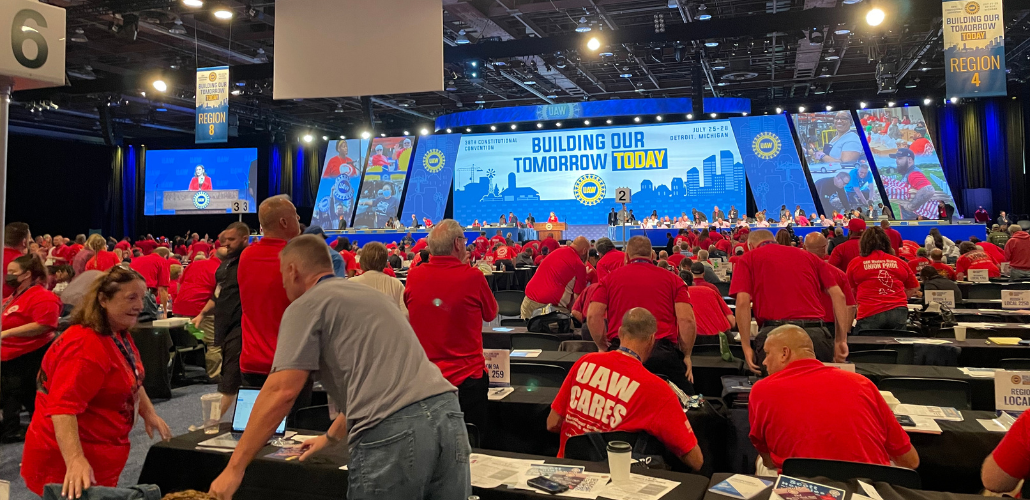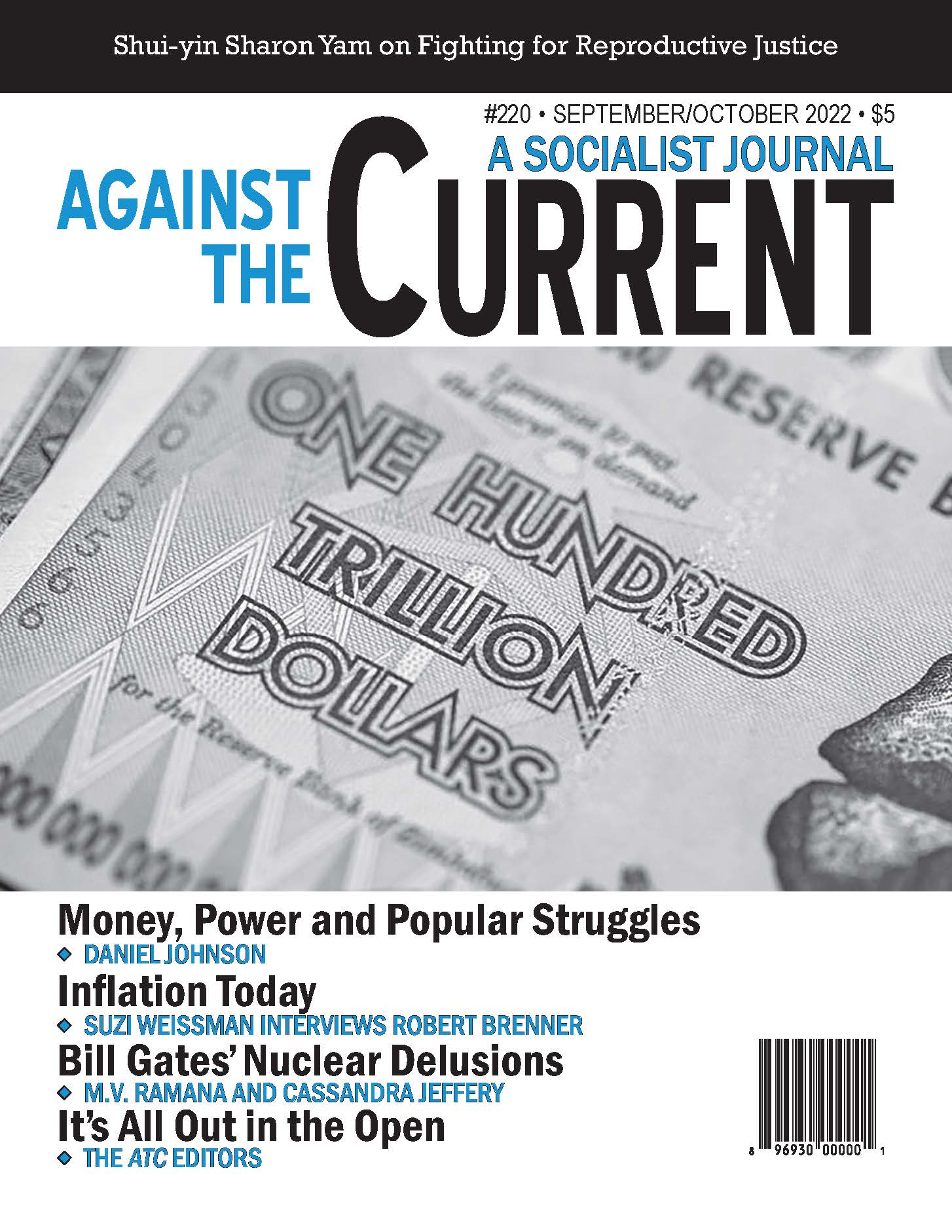Against the Current, No. 220, September/October 2022
-
It's All Out in the Open
— The Editors -
Fighting for Reproductive Justice
— Shui-yin Sharon Yam -
California's Reparations Task Force
— Malik Miah -
The "Bruce's Beach"
— Malik Miah -
2022 Labor Notes Conference
— Dianne Feeley -
Bill Gates and Techno-fix Delusions
— M.V. Ramana and Cassandra Jeffery -
The Fight Over Inflation
— Suzi Weissman interviews Robert Brenner -
UAW Convention: Change in the Wind
— Dianne Feeley -
International Tribunal Verdict: "Guilty of Genocide"
— Steve Bloom -
Philippines: Continuity of Violence
— Alex de Jong -
"Can I at Least Have My Scarf?"
— Anan Ameri -
Echoes of Money in Times Past
— Daniel Johnson - Reviews
-
The War Upon Us
— Jerry Harris -
Texas: Darkness Before Dawn
— Joshua DeVries -
New Veterans, New and Old Problem
— Ronald Citkowski -
Anan Ameri, Life and Community
— Dalia Gomaa -
Joe Burns' Class Struggle Unionism
— Marian Swerdlow -
Radical Memories of Two Generations
— Paul Buhle - In Memoriam
-
Leo Frumkin, 1928-2022
— Sherry Frumkin -
Living with Political Clarity: A Tribute to Xiang Qing
— Au Loong-yu and translated by Promise Li -
Alain Krivine, 1941-2022
— John Barzman
Dianne Feeley

THE 38TH CONSTITUTIONAL Convention of the United Auto Workers (UAW), held July 25-28, 2022 in Detroit, saw the most organized opposition to the rule of the Administration Caucus (AC) since the days of the New Directions caucus 30 years ago.
It was also the first convention since the two most recent UAW presidents — Gary Jones and Dennis Williams — were convicted of embezzling union funds. Just a couple of days before the convention they were released from prison to serve the rest of their sentences from home.
Twelve union officials have been charged with and subsequently pled guilty to stealing from the union or taking bribes from a corporation. A total of $1.5 million has been traced to union dues, with another $3.5 million from training centers partially financed by union dues.
Following a consent agreement with the federal government, agreeing to a six-year federal oversight, a membership referendum adopted a method of one member, one vote elections for top union officials, the International Executive Board. Nominations to the IEB were held during the convention. The election will take place in November.
Convention Dynamics
Delegates elected on the Unite All Workers for Democracy (UAWD) slate represented no more than 8-10 percent of the 900 delegates, yet they were able to have a big impact. UAWD was deeply involved in the successful referendum for membership votes on top officers.
For UAWD convention delegates, the two most critical issues were to begin strike pay from day one, rather than day eight, and to write into the UAW Constitution a prohibition against bargaining contracts with tiers.
On the convention floor and in its daily newsletter, UAWD pointed out that at least three UAW locals struck last year but did not receive strike pay, because they were out less than a week.
With delegates like Nolan Tabb from John Deere and Jessie Kelly, a skilled moldmaker from GM, talking about how they struck their plants for more than a week without strike pay backing them up from day one, the motion easily passed.
Later Yasin Madia, a delegate who had been out on a three-month strike against CNH Industries, made a motion to increase the weekly strike wage from the $400 to $500. (Just weeks before the convention the IEB had raised strike pay from $275 to $400. Raising the pay to $400 had been a UAWD goal, but the IEB beat them to the punch.)
When the raise to $500 was proposed, UAWD delegates enthusiastically supported the motion. It passed 416 yes to 231 no. The press quoted President Ray Curry as saying the motion showed delegates were prepared to use the strike weapon, if necessary, to get a good contract.
But in its final day the convention was consumed by an AC candidate for trustee receiving 63 nominating speeches rather than the two allowed under the rules.
As delegates were forced to leave, an AC delegate made a motion to reconsider the boost in strike pay, claiming the $100 raise would disastrously reduce the strike fund — as if the money wouldn’t aid striking UAW workers and their families.
This brazen trick meant that the AC caucus went on record opposing the increase after voting to increase IEB salaries. Nevertheless the motion to reduce strike pay to $400 carried: 434 yes; 163 no.
UAWD delegates knew that everything would be an uphill battle in a convention where most delegates were either pledged to the AC or intimidated by their control.
This year the delegates’ packet contained a booklet of resolutions passed by locals and an omnibus resolution that the Resolutions Committee had put together and could not be amended, only voted up or down. But the amendment against two-tiers, submitted by a couple of dozen locals, was missing.
Bill Parker, a delegate from Local 1700, motivated discussing the amendment, even if it was missing from the booklet. The tier system, he and other delegates stated, was hated by the membership, as it pitted workers against each other in negotiations. They wanted tiers removed as a bargaining issue. But the AC caucus opposed the amendment on the grounds that it “tied the hands” of the bargaining committee.
After discussion, the amendment was defeated. UAWD delegates had been pretty certain they would not win the vote, but they prioritized the discussion in preparation for the 2023 contracts.
September-October 2022, ATC 220

